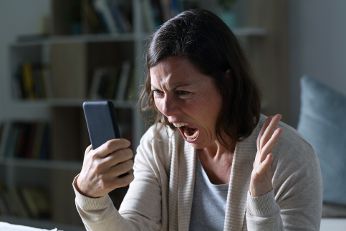
When is a relationship toxic?
“There’s no fixed definition for what are known as toxic relationships,” says Ingrid Sword. “It literally means a poisonous relationship, and it means a relationship with significant destructive patterns, with frequent or constant apportionment of blame, deep one-sided or mutual harm and emotional dependence.” If relationship patterns of this type have crept in, it can be difficult to get out of them without help.
Whenever unpleasant emotions occur and this results in unwanted actions towards your partner, the expert says this is increasingly difficult to control. You often don’t even notice that negative impulses are being repeated.
“In couples it’s common for one of the couple to react aggressively and the other one to withdraw and/or react passive-aggressively. While taking a step back and having a break can be helpful, having a discussion to talk things through is essential.” It’s important to recognise deep-rooted patterns and work on them. Ingrid Sword: “There is an opportunity there if you recognise that your relationship is in a downwards spiral. Relationships are always a great way to learn, including learning a great deal about yourself. You can identify your blind spots, learn to communicate feelings and mental states honestly, finding out how you can live with someone else in such a way that the needs of both partners are met and constantly discover new resources."
The first step to improve the situation would be to recognise your own role in the situation. What’s up with me? What behaviour in my partner triggers what? Do I know it from somewhere? What part do I play in these negative relationship patterns? People mostly look at their partners and want to change them, but most of the time this doesn’t work. The problems can only be solved together.
“Having a discussion is fundamentally a good idea, but the situation is often quite muddled and most of the time too much is pent up for a calm conversation to even be possible. This means rules for the discussion are important, and make sure that partners can actually say what they want to say and learn to listen to one another,” says Ingrid Sword.
This is mostly only possible in a framework in which, for example, the withdrawal holds one of the two partners back and gives the discussion the attention needed from both parties. “Counselling sessions with a trained advisor are ideal in this case. In this protected environment, people often feel freer to discuss problems more openly”, says Ingrid Sword from experience.
In Austria, there are counselling centres in every state that offer supported discussions of this type free of charge. You can use the search function on our website to find a suitable facility near you. Make an appointment.
Our interview partner
Ingrid Sword is a graduate marriage, family and life counsellor and works in the team at IFP Graz Kirchengasse.
Institut für Familienberatung und Psychotherapie (Institute of Family Counselling and Psychotherapy)
Kirchengasse 4/2
8010 Graz
Website IFP
The interview was conducted in December 2022.

_Wutregulierung.jpg)
_Akzeptanz.jpg)